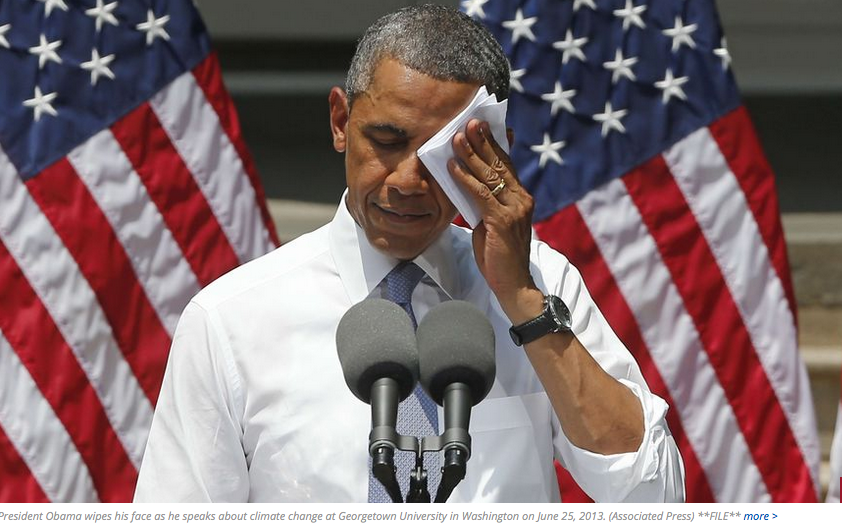A landmark bill allowing for the prosecution of climate change dissent effectively died Thursday after the California Senate failed to take it up before the deadline.
Senate Bill 1161, or the California Climate Science Truth and Accountability Act of 2016, would have authorized prosecutors to sue fossil fuel companies, think tanks and others that have “deceived or misled the public on the risks of climate change.”
The measure, which cleared two Senate committees, provided a four-year window in the statute of limitations on violations of the state’s Unfair Competition Law, allowing legal action to be brought until Jan. 1 on charges of climate change “fraud” extending back indefinitely.
“This bill explicitly authorizes district attorneys and the Attorney General to pursue UCL claims alleging that a business or organization has directly or indirectly engaged in unfair competition with respect to scientific evidence regarding the existence, extent, or current or future impacts of anthropogenic induced climate change,” said the state Senate Rules Committee’s floor analysis of the bill.
Leading the fight against the measure was the Civil Justice Association of California, joined by pro-business groups such as the California Chamber of Commerce and the California Business Roundtable.
Justice association President Kim Stone said she was pleased that the state Senate “realized this bill was extreme.”
“Our concern about the bill is that by eliminating the statute of limitations and reviving claims from forever in the past, it’s fundamentally unfair,” said Ms. Stone.
The statute of limitations under the Unfair Competition Law is now four years. As originally introduced, the bill would have allowed climate “fraud” lawsuits extending back 30 years, but later was amended to provide no time limit, she said.
“This bill would be as if the IRS now said that we could audit you for the first year you filed your taxes, or your parents’ taxes, or even for your grandparents’ taxes. Would you have the documentation required to defend yourself if you were accused of having done something wrong?” Ms. Stone said. “No, nobody would have saved their papers because everyone knows the IRS has three years to audit you.”
The measure was introduced amid a national push by Democrats and activist groups to use the legal system to prosecute climate change “fraud,” prompting a backlash from skeptics who have denounced the campaign as an assault on free speech.
A coalition of 17 state attorneys general, including California Attorney General Kamala Harris, have joined forces to pursue climate change skeptics. At least four prosecutors reportedly have launched investigations into Exxon Mobil for climate change “fraud.”
Introduced by state Sen. Ben Allen, Santa Monica Democrat, S.B. 1161 had strong support from environmental groups, led by the Union of Concerned Scientists.
The group, which had no immediate comment on the bill’s failure, had argued that the measure was needed to challenge efforts to “confuse consumers and fend off competition from lower-carbon energy sources.”
“To be clear, S.B. 1161 does not presume that any fossil fuel company has violated the law. But should the evidence support legal action, S.B. 1161 will give public prosecutors a more powerful tool to pursue it,” Jason Barbose, Western states policy manager of the Union of Concerned Scientists, said in a May 16 post.
“It would be an unfortunate contortion of our justice system for a fossil fuel company to escape prosecution for unlawful acts simply because it successfully hid the evidence from public view. S.B. 1161 protects the public from such a risk,” he said.
The bill is considered dead because the house-of-origin deadline is midnight Friday and the state Senate is not scheduled to meet again before that. Later this year, however, the same language could be reintroduced under a waiver of the rules or inserted into another bill as part of the gut-and-amend process.
Stephen Frank, editor of the conservative California Political Review, called the bill a “totalitarian statement by Democrats that the First Amendment is now dead.”
“Did you donate to the Pacific Legal Foundation? Do you support Americans for Prosperity? Are you a member of the California Republican Party, which has a platform approving of all forms of energy, including fossil fuel (oil)? Do you work for a gas station, an oil company, have you written a letter to the editor in favor of oil drilling?” Mr. Frank wrote in a May 31 post.
“If so, you could find yourself with being charged in a court of law, thanks to S.B. 1161,” he wrote.
The floor analysis cited as a rationale for the bill articles published last year by InsideClimate News and the Columbia Journalism School’s Energy and Environmental Reporting Project accusing Exxon of hiding its research on climate change, which the company has denied.
“By extending the statute of limitations, California has the opportunity to hold these companies fully accountable for their actions,” said the analysis.
The bill declared that there is no legitimate disagreement on the causes and extent of climate change, stating: “There is broad scientific consensus that anthropogenic global warming is occurring and changing the world’s climate patterns, and that the primary cause is the emission of greenhouse gases from the production and combustion of fossil fuels, such as coal, oil, and natural gas.”
Walter Olson of the website Overlawyered called the bill extraordinary and said “the target is clearly public-issue advocacy.”
“Combined with the plans laid by California Attorney General Kamala Harris — part of the alliance of AGs that has sought to investigate not only oil, gas and coal companies, but private advocacy groups and university scientists who have played a role in what is characterized as ‘climate denial’ — the bill would begin laying the legal groundwork for an astonishingly broad campaign of inquisition and, potentially, expropriation,” Mr. Olson said in a May 31 post.
 Listen Online
Listen Online Watch Online
Watch Online Find a Station in Your Area
Find a Station in Your Area








 Listen Now
Listen Now Watch Online
Watch Online
